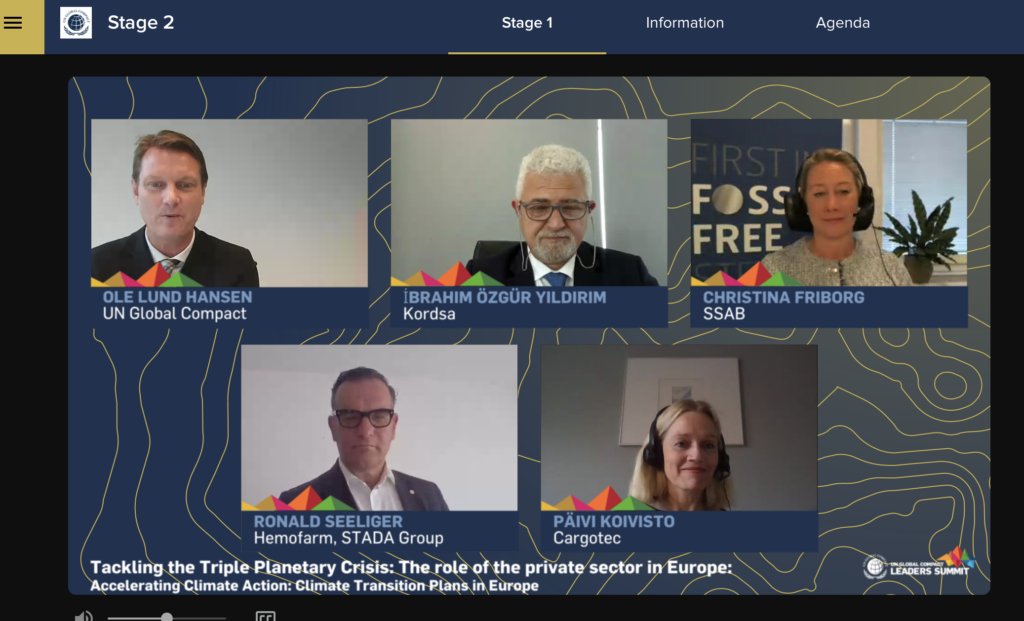Tackling the Triple Planetary Crisis The Role of the Private Sector in Europe – Leaders Summit 202


Speakers:
- PHILIP THORMARK – Global Compact Network Sweden
- CHRISTINA FRIBORG – SSAB
- PÄIVI KOIVISTO – Cargotec
- İBRAHIM ÖZGÜR YILDIRIM – Kordsa
- RONALD SEELIGER – Hemofarm
- PATRICIA KAMERI-MBOTE – United Nations Environment Programme (UNEP)
- OLE LUND HANSEN – UN Global Compact
The role of business to help fashion solutions to address global climate change is critical. It is now 50 years since the original Stockholm conference on the environment and it is clear that sovereign States alone cannot meet the challenges to the environment. Businesses – up and down the supply chain – must increasingly do their part.
The profound implications for the environment that global climate change brings and the role that industry must play to meet those challenges was the context for the “Tackling the Triple Planetary Crisis The Role of the private sector in Europe” panel, part of the UN Global Compact Leaders Summit.
As the world celebrate the 50th anniversary of the seminal 1972 United Nations Conference on the Environment, the first international meeting on the challenges to the environment, “we cannot lose momentum,” warned Patricia Kameri-Mbote, of the United Nations Environmental Programme (UNEP) in a pre-panel fireside chat with Philip Thormark that was also part of the “Stockholm+50 Conference”. “There are no shortages of environmental challenges,” concluded Kameri-Mbote. “We need to rethink how we do business.”
“We need to change the way we live, the way we move. We need to put in place the right policies to provide for the 40 to 70 percent reduction in greenhouse gas emissions by 2050. We are not helpless. We have the solutions,” confirmed Kameri-Mbote, the Director of the Law Division of the UNEP. She set the tone for the discussion of a multiple stakeholder approach to solving the climate crisis that would dominate the later panel: “The time when environmental concerns for only States is long gone. Business’ role is key. It is 2022 is the year we can make plans for long-term sustainable finance, and the sustainability of business actors. We need to move beyond the business as usual model. Industry plays a key role.”
When the panel met, the assembled corporate leaders echoed these remarks. Christina Friborg of SSAB, explained how her company is producing the first commercially viable fossil-free steel in the last year but that “we cannot create the fossil-free value chain cannot be done ourselves. We need to work with others to do this.”
Päivi Koivisto, Vice-President of Sustainability at Cargotec, echoed the importance of working with suppliers and customers along the value chain. “We cannot meet our target alone, but must work with our partners.” She focused on more accurate data to do this. “We engage with our suppliers to understand their targets.” With this strategy her company’s aims to reduce its carbon emissions by 50 percent by 2030 (rather than 2045).
The panelists all maintained that companies must also work with communities. Ronald Seeliger of Hemofarm, STADA Group explained that “our company is deeply embedded in our community. We work with local governments. The company is using renewable energy like solar panels in places like Vietnam where we produce. All these small steps add to something bigger. Little steps in production, marketing and other aspects, can lead to make a daily routine.”
But small steps should not replace a grander vision. Paivi Koivisto concluded that the environment must be part of the company’s core strategy. “We are decoupling economic growth from emissions and asking ourselves: ‘How does a company grow in a low carbon way?’”
“Never give up,” concluded Ibrahim Özgür Yildirim of Kordsa, an automobile and airplane industrial giant in Turkey, about the commitment of industry and the tension between short-term and long-term goals. “We need to continuously improve. We need to take accountability and responsibility.”
This article is part of a series covering the UN Global Compact Leaders Summit. The UN Global Compact (UNGC) Leaders Summit is an annual convening of global stakeholders from the UN, the public and private sectors, and civil society that takes stock of progress of the SDGs so far, and addresses the gaps in knowledge, resources, and funding. The 2022 Leaders Summit, like last year’s summit, will be a hybrid event of live and virtual speakers. Featured venues this year include an in-person event held in Bangkok, as well as virtual plenaries in Latin America, Australia, East Asia, the Middle East, and Africa, in addition to UN Headquarters in New York. This inclusive global event — which will run continuously for more than 24 hours — aims to empower business leaders at every level to take collective action and inspire future leaders to embed a sustainability mindset in their work. ESG News is the exclusive media partner of the event, and will cover all 26 panels.








